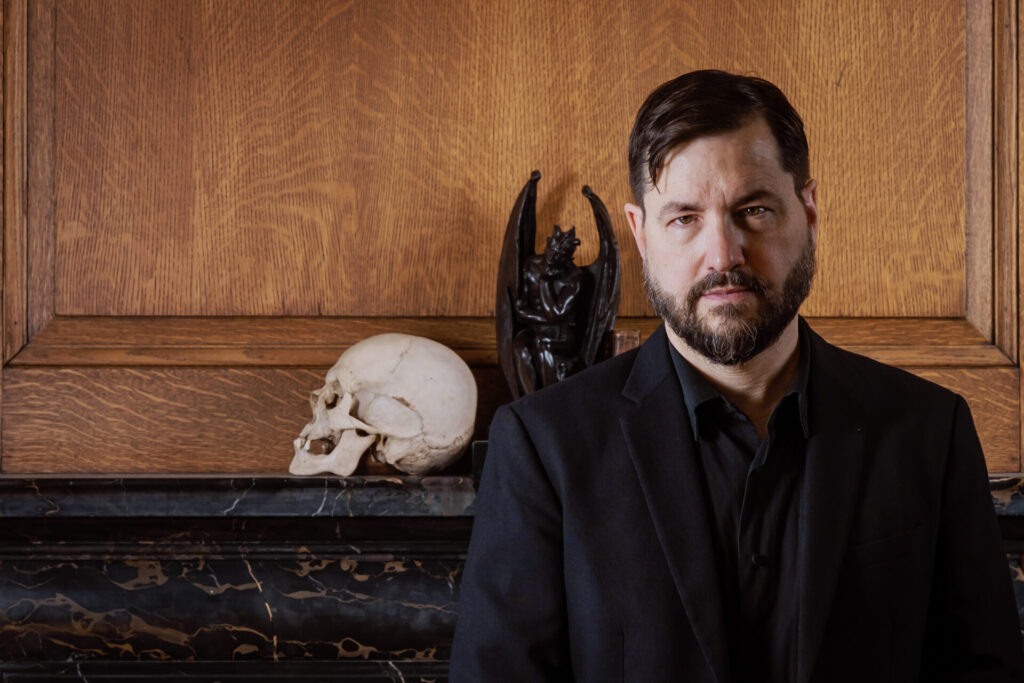Like most of us over the past ten years, I am struggling with how to live my daily life against the backdrop of a global slide into genocide and fascism. Because this is a music publication, I will narrow that down a bit: since the decisive ascension of Trumpist politics in my country, I have struggled in particular with how to proceed as an electronic musician at all in the face of the collapse of neoliberalism and the rise of the fascist right. If the grotesquerie of MAGA’s white supremacist, misogynist, transphobic, hyper-authoritarianism is blatantly apparent, the futility of ‘resistance liberalism’ to ameliorate these conditions was made equally plain in the Biden administration’s complicity with the genocide of Palestinians in Gaza. Electoral politics has failed, and now each day brings new horrors that I don’t think I have the stomach to list, but: in the United States right now, ICE forces are empowered by a judiciary to murder people in the street simply for attempting to observe them as they round up anyone they please (overwhelmingly Black and Brown people) before packing them off to detention facilities where they face the very real threat of torture, sexual assault and abuse, at home or abroad via third country removal. Fascist violence flows in transnational directions, with the US ignoring foreign sovereignty even as we boast of locking down our own border. US troops are now kidnapping foreign leaders and ramping up imperialist expansion without bothering to cloak their actions in even the barest rhetorical figleaf of justificatory talk about democracy or human rights. As we watch the world burn and starve in the face of the new strongmen and the tech billionaire class who enable them, who cares about or needs the all too personal micro-level bonsai snippetry and tasteful waveform sculpting niceties of electronic music? For that matter, why bother making art at all? What’s that going to do for anyone other than create ever more shiny and distracting – or soothingly numbing – commodities that feed the profit machine?
Up to now, it seems that, if I am honest, I have primarily made music as a way to pinball between collective pleasure-seeking and personal experiment. There was always a social and communal dimension to that, insofar as that music was always made in dynamic response to the scenes and local communities that nurtured, inspired, and provoked musical response. You make a rave track for an imaginary dancefloor, you program something that sounds sick so you can play it for your friends, and even when you tinker alone for hours you’re always standing somewhere, with the last show you saw or record you listened to that was made by someone else reverberating in your mind, even in solitude. The patterns you make are a part of a bigger field of patterns. Music is always already inherently social. But it’s selfish too, even in its most seemingly self-annihilating moments. Working for hours and hours on electronic music becomes a way of diving deeper into a kind of formal unconscious, losing one’s self on the grid in a trance of creation, labour, adjustment, loops playing and replaying and shifting and playing and replaying, and yet even in the depths of that enactment of self-annihilation, that flowstate becomes a kind of oceanic holding environment for the self-soothing psyche.
How am I supposed to do that against a backdrop in which I am relentlessly made aware that my tax dollars funded the extermination of Gaza and the military expansion of ICE to a budget that dwarfs the standing armies of entire developed nations? How am I supposed to proceed as if this is acceptable? Living as usual, business as usual, becomes a grotesque act of dog-paddling from appointment to shopping trip to meal eating to streaming to social media to bed in which the disparity between bourgeois comfort and the reality of the camps induces a queasy, uncanny feeling of permanent fracture, a phantom limb tingling, the nagging sense that your comfort is umbilically connected to someone else’s misery. Adorno’s shorthand in Minima Moralia that “Wrong life cannot be lived rightly” returns with a vengeance.
This produces problems of scale and problems of intent: what can one person who likes to make records possibly think they can accomplish in the face of an ongoing slide into state murder and authoritarian politics? During Trump 1.0 I made a crust punk covers record, sampling him on a cover of Nausea’s ‘Cybergod‘ and again on a cover of Aus Rotten’s ‘Fuck Nazi Sympathy‘, giving the proceeds of the record to anti-fascist legal defence. But in the wake of Trump 2.0, I don’t feel the same urge to sample, to integrate the voice of the would-be dictator into my art, to make the art somehow directly about a person whose Teflon resistance to satire and love of attention turns direct critique into a perverse sort of ratification and reward for his endless abuses and bottomless ego. I looped the sound of large protesting crowds singing “Fuck Donald Trump” over and over and he won re-election anyway. The problem gets misconstrued if it is downshifted into a matter of quantifying impact at the level of form: the artist making a record in Style A versus Style B as a response to genocide and fascism is not going to slow down the rate at which refugees are shot or immigrants are harassed and sent to torture camps overseas. No legislator is going to peruse a lyric sheet or comb through the fine print on a Bandcamp release in order to parse their next decision to take medical care away from trans people.
In the past few years, it was a source of great personal joy for me to make music inspired by disco and deep house, and to connect, through form, with likeminded people who could play their instruments in ways that allowed me to build songs collectively within those living traditions. In the aftermath of my previous album Is It Going to Get Any Deeper Than This?, I started to make new music that followed through on those pathways. I started to make music with a beat, with basslines, handclaps, slinky hi-hat patterns. But watching Trump shimmy to ‘Y.M.C.A.’ at Mar-a-Lago, exulting in his nostalgic longings for a past of white entitlement, watching the seamless consumption of disco by the worst and most blatant avatar of racist politics, something curdled and died inside me. I didn’t feel that I could stomach making dance music in the face of this.
If I react to a reactionary what does that make me? A re-reactionary? This is the bad feedback loop of negative determination that seems to pre-empt the possibility of any direct response. I understand how literally kneejerk this all sounds: surely there is a ready-to-hand “baby vs bathwater” distinction to be drawn between the radical dancefloor cultures of the present that I have seen firsthand and that asshole shimmying to the hits up there onstage? There’s a galaxy of difference between queer underground dance music events such as the HONCHO festival melting down bodily boundaries in the heat of August in the woods in Pennsylvania and the grotesque spectacle of a Boomer fascist waddling to the oldies at a GOP convention. I know that at a conscious level. It is certainly not the fault of the Black and Brown innovators of disco that this shitty person likes their music (though it was disappointing to see Gloria Gaynor sidle up next to KISS and Sylvester Stallone to collect honours from Trump).
Here the logic of the fetish returns with a vengeance: “je sais bien, mais quand meme . . . “ (“I know very well, but all the same . . . “): music-making goes deeper than conscious intent and rational political affirmation. I’m not proud of it and not sure what to do with it, but something about my relationship to dance music felt intensely compromised and inhibited by Trump’s love of disco. A lyric from a Swans record surfaces here: “When you touch my things you soil them”. Trump’s embrace of the Village People, his embrace of camp gay disco aesthetics, made me feel that, at least for now, I could no longer explore that territory as a site of nurture or a place of imaginary solace. It had been rendered repellent, soiled by his embrace. When the people who dominate us are campy as they go about their business of domination, then the utility of camp as a queer technology of survival is called into question.
As I have watched my own society get bleaker and uglier, as a pervasive meanness, shabbiness and narrowness has invaded the texture of everyday life, I have sought in music something that feels “other”, some kind of temporary escape hatch from the present lifeworld. For me, this has taken a surprising and perhaps unexpected form: chamber and orchestral arrangements, working with strings and horns and woodwinds, replacing electronic dance music with, er, simply . . . music. For other people this would be the worst kind of escapism, a sheerly conservative turn backwards from the club to the conservatory, a bad-faith flight into the past.
But as someone with no ability to write or read notation and no training of any kind in notes and pitches, my own vexed sense of ignorance and alienation from that entire world and tradition has meant that, for me, a turn towards this kind of structure and these sounds has felt thrilling, forbidden, exotic, unfamiliar, both awkward and intensely exciting, plunging me into a state of musical limerence with such forms and sounds. The horror of everyday life seems to vanish when I sit and tinker in this direction. Perhaps this is a compensatory strategy, a crash position under duress? In an uncomfortable way, I’m reminded of a novel from 1977 by Patricia Highsmith called Edith’s Diary, in which a woman who is intensely isolated and disappointed in her everyday suburban life constructs an increasingly optimistic and serene diary that re-writes her humiliation and sadness into an inverted fantasy of pleasure, success and comfort. It’s a grimly comedic masterpiece because of the blatant disparity between the drab surroundings that Highsmith’s prose depicts and the diary’s own sunny proclamations. Here’s the point of the comparison: I have noticed over the past five years that the uglier the world gets, the more seemingly “beautiful” my records sound.
I am sitting in the studio. I pick up my phone. My social media feed swarms with images of shootings in hospitals, blocked shipments of food aid for starving people, grieving Palestinian parents holding the remains of their dead children in garbage bags. I put down my phone. I open the file of a new oboe performance and chop it up until a form emerges that I like. I send that form to a friend and ask him to play guitar. I pick up my phone. There’s an email from an international student who has been accepted to the graduate program in which I teach but who is not sure if he will be safe in this country: should he come to the United States? I see an image of blood on the airbag of a car; someone was shot by an ICE agent for observing their actions as they detain suspected illegal aliens. I return to my laptop and tighten up an arrangement of music for piano and harp and strings, working with EQ to soften the sharpness of the upper register of the violins. The pattern repeats: a public world of seemingly unending brutality and cruelty, and a private space in which I keep reaching outwards, backwards or away towards feelings I ought to be too embarrassed to list but here goes: delicacy, intimacy, adventure and romance: they seem to beckon in the formal velleities of endlessly spiralling arrangement decisions that have no justification other than my own private pursuit of something that feels, and sounds, “beautiful” to me.
Who am I kidding? Who is saved by this? What possible shelter can the folly garden of a dilettante offer to fleeing people? Whatever happens upon my screen as I move the forms around until I am satisfied, the grim contents of the plastic bag are never going to be knit back together. Those killed by ICE are never coming back from the dead. It would make no difference to anyone in either of these life-destroying situations whether, in their name, I made a blistering power electronics album of rage at the injustice of their fate or a soothing ambient tone cloud to invigilate their loss. This is not to deny that music can memorialize, bear witness, mourn or rage. It can, and has, and will continue, to do all of those things, and they are not nothing. They matter. But they are not enough. Music’s power is immanent to the experience of listening, an experience that is only available to people with the time and freedom to let art enter them and change them, and that time and freedom is denied by a present system of domination that continues to make everyday life unbearable for more and more of us, so that a small percentage can profit from the polycrisis.
My fear in writing this essay is that it is a bunch of handwringing from a tenured bourgeois Shakespeare professor in an English department, and may only amount to the attempted airing out of a “beautiful soul”, i.e. it is an expression of guilty impotence that, beneath the surface of self-critique, is actually self-exculpatory. Don’t blame me, I’m a small person on the sidelines and I feel bad about this stuff too, but, hey, what can you do? Here’s a string quartet for your troubles. This has been an essay with too much “self”, so I will end with a phrase that is the title of a song by Nobukazu Takemura – ‘Evade The Swirling Mimicry‘ – that is the task of the artist at present. Art is not simply a hallucination of otherworldly escape, an Edith’s Diary of symptomatic withdrawal into private reverie. At its best art reminds us of the possibility of freedom in this world, and the reality of our connection to each other as the basis and grounding condition of that freedom’s expression.
Can Such Delightful Times Go On Forever? by The Soft Pink Truth is out via Thrill Jockey this week





